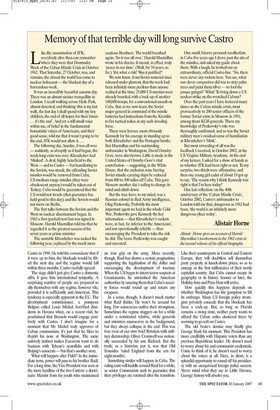Memory of that terrible day will long survive Castro
Like the assassination of JFK, everybody alive then can remember where they were that Doomsday Week of the Cuban Missile Crisis in October 1962. That Saturday, 27 October, was, and remains, the closest the world has come to nuclear holocaust — the blackest day of a horrendous week.
It was an incredibly beautiful autumn day. There was an almost sinister tranquillity in London. I recall walking across Hyde Park, almost deserted, and thinking 'this is my last walk, the last day I shall spend with my tiny children, the end of all hopes for their future ... it's the end'. And yet a still small voice within me, of belief in the fundamental humanistic values of Americans, and their good sense, told me that it wasn't going to be the end. JFK would not allow it....
The following day, Sunday, it was all over — suddenly, as abruptly as it had begun, the week-long crisis was over. Khrushchev had 'blinked'. A deal, highly beneficial to the West — and to Castro — but humiliating to the Soviets, was struck; the offending Soviet missiles would be removed from Cuba; US medium-range missiles (they were obsolescent anyway) would be taken out of Turkey; Cuba would be guaranteed that the US would not invade (that guarantee has held good to this day); and the Soviets would not move on Berlin.
The first talks between the Soviets and the West on nuclear disarmament began. In 1963 a first (partial) test-ban was signed in Moscow. Harold Macmillan told me that he regarded it as the greatest success of his seven years as prime minister.
The unstable Khrushchev was sacked the following year, replaced by the much more cautious Brezhnev. The world breathed again. `So it was all over,' Harold Macmillan wrote in his diaries. It meant, in effect, truly 'peace in our time'. (Well, for 54 years, so far.) Yet, what a risk! Was it justified?
We now know, from Soviet material since released under glasnost, that the week had been infinitely more perilous than anyone realised at the time: 25,000 US marines were already boarded, with a back-up of another 100,000 troops, for a conventional assault on Cuba. But, so we now learn, the Soviet major-general in command of the missile batteries had instructions from the Kremlin to fire tactical nukes at any such invading force.
There were heroes, most obviously Kennedy for his courage in standing up to both Khrushchev and the Pentagon hawks. But Macmillan and his outstanding ambassador in Washington, David OrmsbyGore, were also heroes. Little is made in the United States of Ormsby-Gore's vital contribution — suggesting, in the White House, that the exclusion zone barring Soviet missile-carrying ships be reduced from 800 to 500 miles off Cuba. This gave Moscow another day's sailing to change its mind and climb down.
But the true hero, to my mind, was a Russian colonel in Red Army intelligence, Oleg Penkovsky. Probably the most important agent we had in the whole Cold War, Penkovsky gave Kennedy the key information — that Khrushchev's rockets were, in fact, far inferior to the Americans', and not operationally reliable — thus encouraging the President to take the risk he did. The brave Penkovsky was caught and executed.
One small, bizarre personal recollection: in Cuba five years ago I drove past the site of the missiles, and asked my guide about them. With a laugh, he trotted out an extraordinary, official Castro line. 'No, there were never any rockets here. You see, what our clever campesinos did was to strip palm trees and paint them silver — to fool the yanqui gringos!' What! To bring down a US nuclear strike on the wretched Cubans?
Over the past years I have lectured many times on the Cuban missile crisis, most provocatively to 200 senior officers of the former Soviet army in Moscow in 1991, among them KGB generals. There my knowledge of Penkovsky's role was thoroughly confirmed; and so was the Soviet military men's residual sense of humiliation at Khrushchev's 'blink'.
But most rewarding of all was the feedback I received, in October 2002, at the US Virginia Military Academy. At the end of my lecture, I asked for a show of hands as to whether JFK had been right or not. To my surprise, two thirds were affirmative; and then one young girl cadet of about 19 got up to say, The reason why I think Kennedy was right is that I'm here today!'
One last reflection: on the 40th anniversary of the 'Cuban Missile Crisis', October 2002, Castro's ambassador to London told me that, dangerous as 1962 had been, `the world is an infinitely more dangerous place today'.
Alistair Horne Alistair Home gives an account of Harold Macmillan's involvement in the 1962 crisis in the second volume of his official biography.





















































 Previous page
Previous page